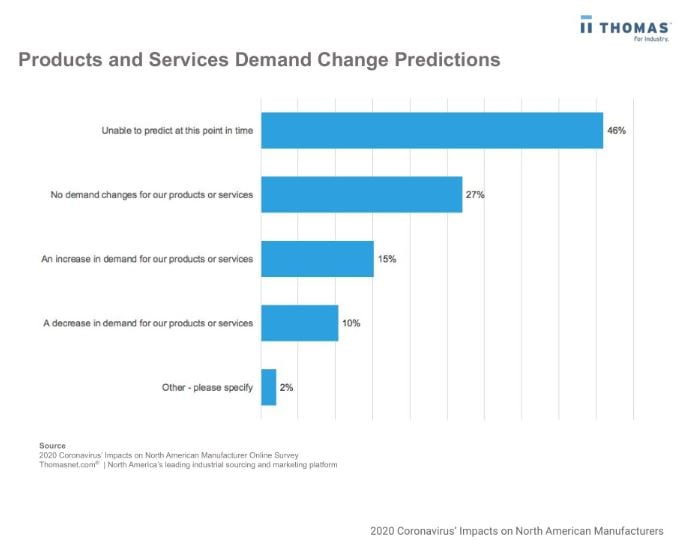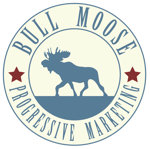
The sudden appearance and rapid spread of the coronavirus (COVID-19) has plunged the United States, like most of the world, into the same uncertainty characterized by the fog of war. Our modern society has experienced nothing like it. Neither has our economy. For manufacturers, the supply chain, while still adjusting to a salvo of tariffs, has been disrupted in ways that won’t be realized for years.
Domestically, the effects have been immediate, though. A recent Thomas survey gauging COVID-19’s impact on over 1,000 North American manufacturers found that:
- 45% reported disruptions to their shipping and logistics
- 35% reported incidents of offshore factory suspension or production restrictions
- 31% are having to turn down or delay orders
- 10% reported drops in product demand
- 8% experienced a surge to their cost of goods
 Adding to the turmoil is the rapid and constant fluidity of the situation. Suppliers are in constant flux as state and federal officials issue daily directives meant to slow the virus’s spread. Depending on location, many suppliers are left to wonder if they qualify as an “essential” business or if they are exempt from mandatory shutdowns. Others are trying to figure out the status of material orders while trying to manage employee concerns. Like war, confusion reigns supreme and no company is unaffected.
Adding to the turmoil is the rapid and constant fluidity of the situation. Suppliers are in constant flux as state and federal officials issue daily directives meant to slow the virus’s spread. Depending on location, many suppliers are left to wonder if they qualify as an “essential” business or if they are exempt from mandatory shutdowns. Others are trying to figure out the status of material orders while trying to manage employee concerns. Like war, confusion reigns supreme and no company is unaffected.
Now, more than ever is the time for manufacturers to exercise that intuitive, discerning judgment Clausewitz called for. This principle applies to every aspect of a company’s business, and marketing, while not always a priority, can offer lasting advantages that will help US manufacturers weather the fog of war.
Here are 11 sales and marketing tactics manufacturers can employ right now to help in dealing with the challenges of COVID-19.
- Post a COVID-19 Policy – A lot of people inside and outside of your company are going to wonder where things stand. Draft up a short statement to let the public know how the virus is impacting your operations. If you are open, explain why if it’s because you’re an essential business or under an exemption. Detail what measures the company is taking to stop the virus’s spread and provide reliable contact information for further questions. Post this using a popup on your website and your social media channels. (We’ve provided a template at the end of this post.)
- Update Your Hours – This sounds minor but given the circumstances, it’s a big deal. Make sure your hours are updated on your website, your social media channel, Google My Business listing and other online directories. Make sure you clarify if you are or not accepting shipments or visitors. People have no idea who and who isn’t open, don’t add to their frustration by letting them think you are open per usual.
- Plan Internal Communications – Keeping employees calm and focused is imperative at this moment. This is where an internal communication plan is an effective tool. Company-wide emails may be enough, but this also can add to the confusion when only a few see the information and at different times. Having a dedicated Company Alerts page on your website or internal portal as a consistent focal point with the most current information can become the trusted resource everyone turns to reduce misinformation.
- Use your Company Newsroom – Most manufacturers already have a News section on their sites. If not, it can easily be added. Use this as the place to post regular updates that your suppliers and customers can keep up to date with general developments impacting operations. Ask them to subscribe to your newsroom updates so they will be alerted by email anytime your company posts new information.
- Leverage Email Automation – Email automation is going to be your most efficient way to reach audiences with critical news or updates not meant for the general public. Don’t just put out email blasts to your entire database of contacts. Categorize customers, suppliers, partners, manufacturing reps, etc into segmented lists to send out updates that are more specific to those groups. Also, make sure to keep an eye on analytics showing who opened the emails as this might create an opportunity for sales to follow-up with that person one-on-one.
- Scale up your Digital Marketing – As social distancing eliminates many in-person sales and marketing activities, digital channels are now the best, and often lowest cost, way to reach people. Start creating help content for your website and for sales to send in emails. Sales can start leveraging tools like LinkedIn for social selling, while marketing can explore other digital channels for distributing messaging including advertising. According to marketing technology firm 4C Insights Inc. ad spending on Facebook, Instagram and Twitter is already up 25% over this time last year.
- Improve your Search Engine Optimization (SEO) – SEO can make a big difference for manufacturers right now. That same Thomas study found that 28% are seeking new domestic supply sources. Depending on the segment procurement professionals, engineers, and operations managers are needing to scale up production, develop new products, or find suppliers to replace foreign sources or US ones who had to close their doors. Going to the Internet has been the leading way to search for these options in the past, now more than before, you want to make sure you are using both on and off-site SEO tactics that will get your found.
- Look into Virtual Events – Events like trade shows and conferences are getting canceled left and right due to social distancing. For many manufacturers, this has been their bread and butter for gaining awareness and finding new leads. With this off the table, companies are now getting creative with virtual events. Now is a good time to think about putting on webinars. Were you speaking at a conference that got canceled? Host the talk on a webinar or invite one of the conference speakers to give their presentation through a webinar that you set up and promote. It will cost less than the show itself and won’t let a good topic go to waste.
- Co-Marketing with Partners – In that same vein of thought, check with your supply partners to see if they would be interested in co-marketing opportunities like publishing a joint case study or co-hosting a webinar. Your partners are likely dealing with the same confusion everyone is, so offering them some solutions that benefit both parties can help strengthen that relationship during troubled times.
- Focus Sales with Account-Based Marketing (ABM) – ABM, if you’re not already familiar with it, is a targeted approach that focuses both sales and marketing efforts on specific targeted accounts with a high strategic value to your company. There’s a lot of moving parts with ABM, but it tends to yield much better results than a blanketed approach. Technology is a key component in ABM. For example, marketers can add free tools to their websites such as Webtrax or HubSpot’s Prospecting Alerts to see what companies are visiting their site and how often. Using this data intel, sales teams can then leverage tools like LinkedIn Navigator to identify key people at those companies who likely have roles within the purchase process that they can reach out to with highly relevant marketing content.
- Formalize a Marketing Strategy – Finally, many suppliers talk about formalizing their marketing strategy at some point down the road, but day-to-day realities tend to make that point a moving target. While it may be chaotic right now, it might also be the time to invest the time and resources into outlining a near and long-term marketing strategy that is synced to business objectives, outlines the most effective tactics, and defines the benchmarks for success. This is especially important for manufacturers who will be forced to look at new markets and adjust to the changes in their current ones.
These are uncertain times that will require tough decisions by most companies out there. The ones who successfully navigate the fog of COVID-19 will be well-positioned when it lifts, and marketing can play a key part in that success. Even if you don’t have all the resources you need, don’t dismiss marketing altogether. In the words of President Theodore Roosevelt, who won the Medal of Honor during the Spanish-American War for his boldness amid the chaos at Kettle Hill, “Do what you can, with what you have, where you are.”
Sample Response Template
[COMPANY NAME] COVID-19 Response Policy
[COMPANY NAME] takes the COVID-19 situation seriously, and in response, we are complying with current mandates established by both the Federal Government and the state of [STATE]. Under the most recent regulations, [COMPANY NAME] will continue to operate [WHY YOU ARE STILL OPERATING i.e. according to the exemption made for medical equipment manufacturers. OR REASON FOR NOT OPERATING]. We are, however, following best practices set forth by the CDC for preventing the spread of the virus. This includes [MEASURES BE TAKEN i.e. hand washing, social distancing, modified schedules, suspending business travel, limited access to our offices, and working remotely where possible]. With these measures in place, we recognize there may be delays in communication, and apologize for any inconvenience this may cause. [COMPANY NAME] appreciates your understanding during this period, as we support the health and safety of our community. For questions please contact [RELIABLE CONTACT METHOD.]






